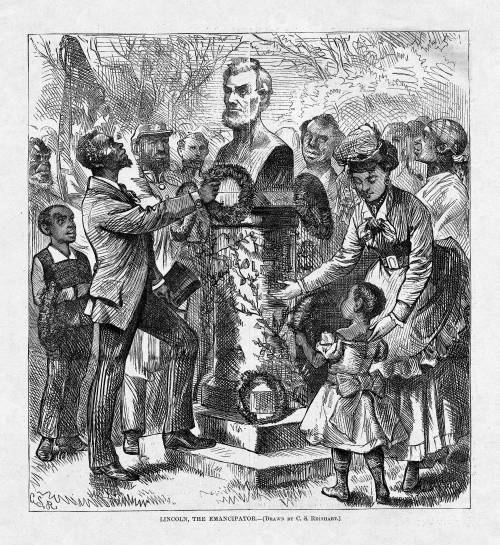There is no person more important to the struggle for the civil and constitutional rights of black Americans than President Lincoln. That does not take away the enormous work of major civil rights advocates – black and white. Others such as Sojourner Truth, Harriet Beecher Stowe, Frederick Douglass, Harriet Tubman, William Lloyd Garrison, Lucretia Mott, David Walker, John Brown – and more recently Martin Luther King.
But Lincoln was unique because he actually achieved the singularly most important step in bringing freedom, justice and equality to America’s black population. He not only freed them from slavery – but ended the evil institution once and for all. He also set them on the path of full citizenship – an effort that was thwarted for more than 100 years by Democrat resistance.
There are those who – for political reasons or out of ignorance – say that Lincoln was not devoted to ending slavery and providing all black citizens the promise of equality that was inscribed in the Declaration of Independence – whether they had been slaves or freemen at the time of the Civil War. In fact, Lincoln often cited Thomas Jefferson’s words – that “all men are created equal” as the foundation of his abolitionist views.
Lincoln’s sentiment was evident in his proclamation that a house divided cannot stand. He declared that slavery must exist everywhere in America … or nowhere. His entire life’s devotion was to the latter.
Among some folks, it has become fashionable to recast Lincoln as a racist. That he did not believe in the extension of constitutional rights to blacks. It is the product of pseudo-intellectualism by folks on the left. They cite times when Lincoln yielded to the zeitgeist of the day. In one campaign, he told a crowd that he did not condone of marriage between blacks and whites. At another time, he said uniting the Union was paramount – whether slaves were freed or not.
Lincoln’s friends, historians and even Lincoln, himself, attributed such statements to political pragmaticism. Like all politicians, he sometimes said what the specific public wanted to hear – or more accurately, did not say what they did not want to hear.
Many historians argue that with out bending to such pragmaticism, Lincoln would never have been elected to do the more noble things in which he believed. For every time that Lincoln succumbed to political pragmatism, there are thousands of times he continued to spread his belief in the equality of all men.
Lincoln came to the presidency as a well-known abolitionist. That is why slave states began seceding immediately after his election – and even before he took office. In virtually all the Articles of Secession, the leaders of the Confederacy cited the protection of slavery as the primary reason. It was the reason for secession and ergo the reason for the War.
However, anyone who studied even a portion of Lincoln’s writings and speeches, would know that he was morally and irreversibly dedicated to abolition of slavery. What is remarkable about Lincoln is that he accomplished the ending of slavery. It was Lincoln who proposed the 13th, 14th and 15th Amendments to the Constitution that guaranteed the civil rights of all citizens – the first of which was enacted before his assassination. He could never have imagined how the party of slavery – the Democratic Party – could have thwarted the noble purpose of those amendments – and the laws and court decisions that supported them.
To say the least, Lincoln was a remarkable human being. He was not a person of his times, but a person who changed his times – and he did it with firm moral belief and enormous personal and political courage. His determination to end slavery and provide for the civil rights of black Americans ultimately cost him his life.
It is not coincidence that those who demean Lincoln – and distort his beliefs and record are almost always … Democrats. It’s a partisan thing. They repeat the mendacious narratives about Lincoln like trained parrots because it suits their political biases. Those who eradicate Lincoln’s name from schools or tear down his statues are – I am sorry to day … ignorant fools.
While the Democratic Party continued in its traditions of racial bigotry, oppression, segregation and violence against black Americans for 100 years after the Civil War and the assassination of President Lincoln, even that struggle would have been crushed by the continuation of slavery had Lincoln not inspired and led the abolitionist movement. Were it not for Lincoln – and the cadre of Republican abolitionists who preceded and followed him – slavery would have gone on for years, decades – perhaps even generations.
America was blessed with two remarkable men at the most critical times in the nation’s history. George Washington – who, as the first President, established the precedence of a citizen-based government from which power belongs to and arises from we the people. And Abraham Lincoln – who set the nation on a new course of freedom. He did what many of the Founders had hoped. He ended America’s original sin.
Every decent person in America – black, white or anything else – should be thankful to Lincoln for ending slavery – and with it a broader evolving range of racial intolerance.
So, there ‘tis.
